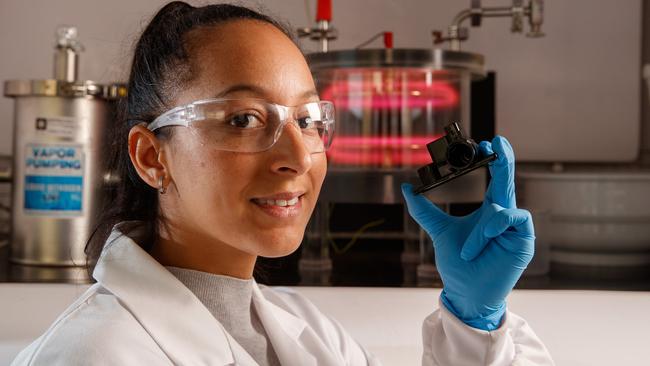UniSA cancer detective trials new device to test urine
UniSA research combined with industry know-how has created a clever device to detect cancer in a urine sample and save patients from current invasive and uncomfortable diagnostic tests.
A deceptively simple device made in Adelaide can be used to detect cancer cells in a urine sample, UniSA research shows.
It is hoped the urine test will replace an invasive and stressful diagnostic procedure called cystoscopy, which involves inserting a tiny camera into the urethra and up into the patient’s bladder.
Dr Melanie MacGregor, of the UniSA Future Industries Institute, said a preclinical trial using urine samples from 35 patients with bladder cancer also captured cells from prostate cancer, demonstrating the test’s broader potential.
“If it works for this disease, the device and the capture principle is so versatile that I could develop that in many other ways to test for other diseases,” she said yesterday.
“There’s nothing to stop you from testing saliva instead or something called pleural fluid in your abdomen to help detect lung, stomach, kidney, or colon cancer.
“I see lots of potential so that's what is really exciting.”
Urologists at Flinders Medical Centre and Noarlunga Hospital are recruiting 400 patients for a clinical trial of the device, which will study how it compares to a cystoscopy and to visual cell screening of urine by a pathologist.

Dr MacGregor said the rapid development of the device had only been possible because the university teamed up with an industry partner willing to make it in Adelaide.
SMR Technologies, based in Lonsdale, is now looking for a commercial partner to take the product further.
The patient would simply wee into a cup at the clinic and hand their sample to the urologist. In future the test may also be performed by a GP or even in the privacy of the patient’s own home.
When the urine is poured into the small black plastic device, any cancer cells are selectively captured by antibodies anchored to a plasma polymer coating.
To presence of cancer cells is confirmed by a distinct red glow, using patented technology that takes advantage of the fact cancer cells have trouble metabolising a certain amino acid that becomes fluorescent.
Bladder cancer survivor Rose Blackthorn, 38, of Bridgewater, said shewas “really glad to hear” about the research and “so excited to think about the benefits of the device”.
She hated having to endure the necessary evil of three-monthly cystoscopies.
“Each time the appointment comes around I become increasingly anxious about the result but also of the procedure, which I experience as very uncomfortable both physically and emotionally,” Ms Blackthorn said.
“It's so great to think there could be an alternative in the future.”

